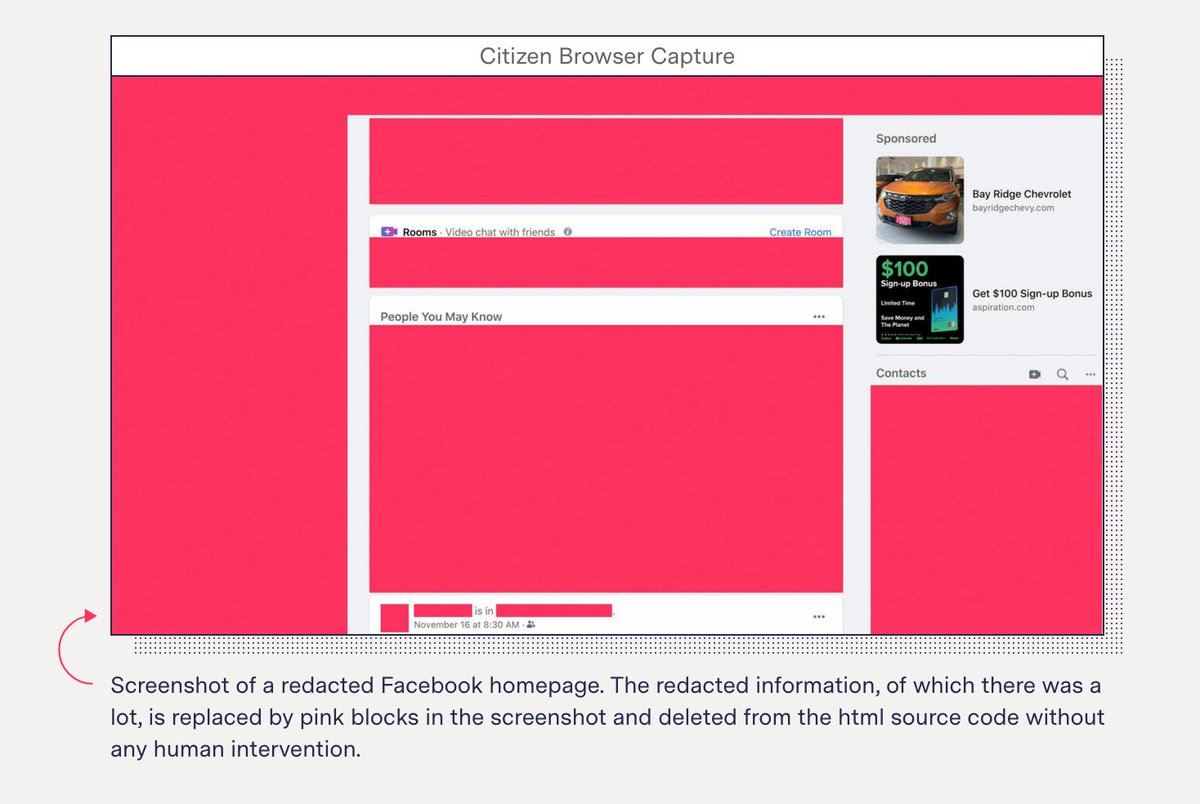
Facebook is a newstand. But no one can see which news Facebook is pushing to the top.
So we built an app for that called #CitizenBrowser. Our first finding: the sharp impact of Facebook’s political ad ban reversal in the Georgia Senate elections.
themarkup.org/citizen-browse… /1
So we built an app for that called #CitizenBrowser. Our first finding: the sharp impact of Facebook’s political ad ban reversal in the Georgia Senate elections.
themarkup.org/citizen-browse… /1
This is the first report from our #CitizenBrowser project. There will be many more to come. But first, I want to tell you a bit about how we did it because it’s the most ambitious thing we’ve ever done @themarkup – and we do a lot of ambitious projects. /2
#CitizenBrowser grew out of conversations @suryamattu and I had about how to audit Facebook. We had both worked on browser extensions to collect data from Facebook, but FB always threatened to shut those down, just like their recent threats against the NYU AdObservatory. /3
But the bigger problem is that browser extensions don’t capture most FB activity. Most people use FB on mobile and browser extensions only work on desktop or laptop computers.
So one night, late at the WeWork, @suryamattu said to me: “We’ll have to build our own browser.” /4
So one night, late at the WeWork, @suryamattu said to me: “We’ll have to build our own browser.” /4
“No way,” I said. “That’s insane.” But slowly, I came around. Here’s why: browsers are good at running in the background. Users could log into FB once through the browser and never use it again.
Then we wouldn’t be monitoring users. We would only be monitoring their feed. /5
Then we wouldn’t be monitoring users. We would only be monitoring their feed. /5
So we built a browser. Ok, not quite. We built an Electron app that automates data collection using the Chrome web browser. Then we built tools that remove personal identifiers from that data, such as users’ names and their friends’ names, and discard them. /6 

Then we hired a survey research provider to invite a nationally representative sample of U.S. adults to install the app. Panelists are paid to participate and yes, they understand the privacy issues—here is the Privacy FAQ we provide for panelists.
themarkup.org/citizen-browse… /7
themarkup.org/citizen-browse… /7
Our panel consists of around 1,000 paid participants from 48 states. It's reasonably representative although we could use more Latinos and Trump voters and our crew is older and more educated than the U.S. population, which reflects desktop computer usage. /8
The panel gave us our first peek inside the black box of Facebook’s algorithms. In the past month we saw how news feeds in Georgia changed dramatically when Facebook flipped the switch to turn on political ads. themarkup.org/citizen-browse… /9
And we have much more to share with you in the coming weeks. Sign up for our #CitizenBrowser newsletter to follow along as we try to understand the social media algorithms that shape our lives. themarkup.org/newsletter /10
As always, we show our work. For more details on how we built our app and assembled our panel, read our methodology. themarkup.org/citizen-browse… /11
I couldn’t be prouder our insanely dedicated team who made this happen: @suryamattu @leonyin @corintxt @angiewaller @jonkeegan @sammorrisdesign @mynameisfiber @magiccia @cortesi @jeffcrouse @iaaaan @rinapalta @simplysecureorg /end
P.S. If you want a TL;DR version of the #CitizenBrowser project, today's newsletter is a good place to start. getrevue.co/profile/citize…
• • •
Missing some Tweet in this thread? You can try to
force a refresh






